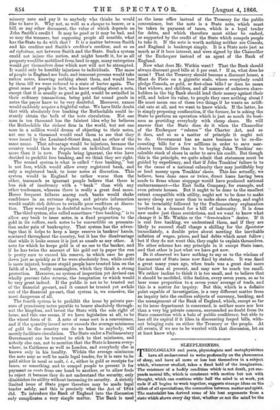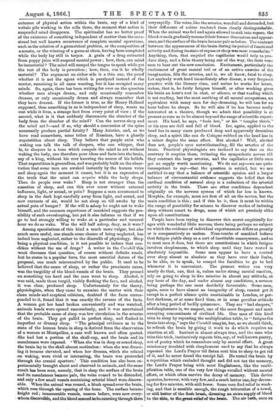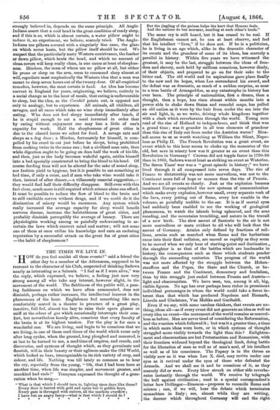ST-PR PLESSNESS.
FIBOLOGIANS and poets, physiologists and metaphysicians
1 ha-re all and
to write profoundly on the phenomena
of sleep, and have all more or less lost themselves in a subject which, whenever studied, takes a fixed hold of the imagination. The- existence of a bodily condition which is not death, yet sus- pends mental life,- which is consistent with motion but not with thought, 'which can continue while half the mind is at work, yet ends if all begins to vrork together, suggests strange ideas on -the oldest of all speculations, the connection between matter and spivit.
• The materialist has derived some of his best arguments from a state which shows every day that, whether or, not the mind be the
outcome of physical action within the brain, say of a kind of voltaic pile working in the cells there, the moment that action is suspended mind disappears. The spiritualist has no better proof of the existence of something independent of matter than the occa- sional but well known occurrence of complete mental operations, such as the solution of a geometrical problem, or the composition of a sonata, or the winning of a game at chess, having been completed while the body lay still in torpor. A grain of a drug extracted from poppy juice will suspend mental power ; how, then, can mind be immaterial? The mind will compel the tongue to speak while yet the rest of the body is powerless ; how, then, can it be wholly material? The argument on either side is a thin one, the proof whether it is not the agent which is paralyzed instead of the master, remaining in all cases wanting, but it has occupied many minds. So, again, there has been writing for ever on the question whether men always dream, and only occasionally remember dreams, or only occasionally dream and always remember that they have dreamt. If the former is true, as Sir Henry Holland supposed, then something in us is independent of sleep, wants no rest while it lives, a strange fact from every point of view ; if the second, what is it that suddenly disconnects the slumber of the body from the slumber of the mind? Can the nerves sleep and the mind act ?—and if so, why should a concussion of the spine necessarily produce partial fatuity? Many Asiatics, and, as we have read somewhere, some tribes of Russians, have a ghastly superstition about sleep. They believe that people exist who waking can talk the talk of sleepers, who can whisper, that is, to sleepers in a tone which compels the mind to act without waking the body, can therefore pour ideas and facts into the brain, say of a king, without his ever knowing the source of his beliefs. That superstition is groundless, and was probably built on the obser- vation that some men are awaked instantly by the human voice and sleep again the moment it ceases, but it is an expression of the truth that the mind can acquire while the body sleeps. 'Then do people ever wake ? Sleep is not stranger than the --cessation of sleep, and can this ever occur without external influence, light, or sound, or pain? Suppose a man accustomed to -sleep in the dark kept carefully away from light, and sound, and -new currents of air, would he not sleep on till awoke by the actual pain of hunger? If the will is asleep he ought not to wake himself, and the common experience of mankind suggests the pos- sibility of such oversleeping, but yet it also informs us that if we go to bed strongly willing to wake at a particular and unusual lour we do so wake. Was the will half asleep, dozy, as it were?
Among speculations of this kind a much more vulgar, but also much more useful, one stands some chance of being neglected, has indeed been neglected, rather to the discredit of physiology. Sleep being a physical condition, is it not possible to induce that con- edition without the use of drugs? A writer in the Cornhill this week discusses that question, of course without definite result, but he states in a popular form, the most essential datum of the proposal, one much misconceived by the public. It used to be believed that the cause of sleep, or rather the proximate cause, was the turgidity of the blood-vessels of the brain. They pressed -on something too hard and the man went to sleep. Alcohol, it -was said, made them turgid, visibly flushing the face, and alcohol, it was clear, produced sleep. Unfortunately for the theory, physiologists, when they came to examine the matter with their 'clean minds and sceptical criticism, doubted if the- facts corres- ponded to it, found that it was exactly the reverse of the facts. A woman got her head broken conveniently and was watched, -animals heads were opened remorselessly, and it was ascertained that the probable cause of sleep was low circulation in the arteries of the brain. They got pallid in perfect sleep, and flushed in imperfect or dreamy sleep. "The principal evidence as to the -state of the human brain in sleep is derived from the observation -of a woman at Montpellier, a case well known and often quoted. -She had lost a portion of the skull-cap, and the brain and its anembranes were exposed. 'When she was in deep or sound sleep, the brain lay in the skull almost motionless :.. when she was dream- ing it became elevated, and when her dreams, which she related on waking, were vivid or interesting, the brain was protruded through the cranial aperture.' This condition has also been ex- perimentally brought about and observed in animals, and the same result bas been seen, namely, that in sleep the surface of the brain -and its membranes became pale, the veins ceased to be distended, and only a few small vessels containing arterial blood were discern- able. When the animal was roused, a blush spreadover the brain, which rose through the opening of the bone. The surface became bright red ; inneem.erable vessels, unseen before, were now every- Thera dienemilake, andebe blood eesentelta be ceursing through them very. rapidly. The veins, like the arteries, werefull and distended, but their difference of colour rendered them clearly distinguishable. When the animal was fed and again allowed to sink into repose, the blood-vessels graduallyresumedtheir former dimensions and appear- ance, and the surface of the brain became pale as before. The contraat between the appearances of the brain during its period of functional activity and during its state of repose or sleep was most remarkable" Anything, then, that emptied the capillaries would help to pro- duce sleep, and a false theory being out of the way, the facts were seen to bear out the new oonelusion. Excitement, particularly the excitement of great mental toil or of an active eseecise of the imagination, fills the arteries, and as, we all know, fatal to sleep. Let anybody work hard immediately after dinner, a very frequent practice with the literary class, and unless he works for hours, unless, that is, he fairly fatigues himself, or after working gives his brain an hour's rest in chat, or silence, or that reading which is not reading, but the most soothing of all mental occupations, an equivalent with many men for day-dreaming, he will tom for an hour before he sleeps. So he will also if he has become really interested at a theatre, though we admit that possibility is at present so rare as to be almost beyond the range of scientific experi- ment. His head, he says, "feels hot," or his "temples throb," or his eyes are dull and fall of blood. Ice, again, applied to the head has in many cases produced deep and apparently dreamless sleep, and a spirit like can de Cologne rubbed on the head has in a minor degree the same effect. But alcohol ? Well, alcohol does not, people's eyes notwithstanding, fill the arteries of the brain. Practical physiologists are inclined to say that on the contrary it empties them, irritating the sympathetic nerves till they contract the large arteries, and the capillaries or little ones get no supply worth mentioning. We do not say—we are quite incompetent to say—that the question is settled, but we are entitled to say that a balance ef scientific opinion and a larger balance of circumstantial evidence suggests the belief that the cardinal condition of natural sleep is a reduction of the arterial activity in the brain. There are other conditions dependent originally on the nervous system of which far less is known. Morphia, for example, must act first of all on the nerves, but the main condition is this ; and if this be it, then it must be within the range of possibility for science to discover modes of inducing sleep without resort to drugs, none of which act precisely alike upon all constitutions.
People have been trying to discover this secret empirically for ages with wonderful little success, there being perhaps no subject on which the evidence of individual experimenters differs so greatly or is comparatively so useless. Nine-tenths of mankind believe that fatigue yields sleep as a sort of inevitable conseqttence, and so to most men it does, but there are constitutions in which fatigue involves sleeplessness, to which sleep until they have rested is absolutely impossible. Some men appear to have a control over sleep almost as absolute as they have over their limbs, to be able,. so to speak, to compel the faculties to go to bed whenever it is convenient. The present writer can very nearly do that, can, that is, unless under strong mental emotion, rely on going to sleep in five minutes in almost any attitude, at any hour of the day, and under almost any conditions, a sermon being perhaps the one most decidedly favourable. Some men, again, seem to have almost an incapacity of sleep, cannot get it except in a perfect silence quite unattainable in London, or per- fect darkness, or at some fixed time, or in some peculiar attitude after along period of bodily quiescence. They are "bad sleepers," and sleeplessness is, we suspect, one of the most frequent and most annoying concomitants of civilized life. One man of this kind tries to sleep by repeating the multiplication table, to " fatigue the brain into sleep," says the Cornhill essayists but, as we should think, to refresh the brain by giving it work to do which requires no exertion at all. Instinct is almost always true, and the man who tries this trick, instinctively repeats bits, say, of well known poetry, not of poetry which he remembers only by mental effort. A great miesionary troubled with sleeplessness used, to say that he always repeated the Lord's Prayer till Satan sent him to sleep to get rid of it, and he never found the receipt fail. He rested, the brain by a repetition which excluded thought and did not tax the memory, the Lord's Prayer being with most Englishmen, like the multi- plication table, one of the very few things recalled without, mental effort, or which often survive the decay of memory. This device operates, however, with very few, and a much Letter one, day-dream- ing for five minutes, with still fewer. Some men find relief in wash- ing, and that is sensible enough, the rough trituration of a towel, or stilt better-of. the-fleabehrush, directing an eadra supply of blood to ther skin, to Vatereabrelief of the brain. The air bath, once so strongly believed in, depends on the same principle. All Anglo- Indians assert that a cool head is the great condition of ready sleep, and if this is so, which is almost certain, a water pillow ought to induce it, an experiment, we believe, scarcely tried. The Anglo- Indians use pillows covered with a singularly fine cane, the glaz3 on which never heats, but the pillow itself should be cool. We suspect that the particularly nasty Western contrivance, the feather or down pillow, which heats the head, and which no amount of clean covers will keep really clean, is one cause at least of sleepless- ness. Hindoos, the mass of whom use no pillow at all, but either lie prone or sleep on the arm, seem to command sleep almost at will, repudiate most emphatically the Western idea that a man was meant to sleep seven hours out of the twenty-four. Of all empirical remedies, however, the most certain is food. An idea has become current in England for years, originating, we believe, entirely in a social change as to the hour of meals, that eating is unfavourable to sleep, but the idea, as the Cornhill points out, is opposed not only to analogy, but to experience. All animals, all children, all savages, and all races which take no wine sleep immediately after eating. Who does not feel sleepy immediately after lunch, if he is stupid enough to eat a meal invented in order that by eating without enjoyment one may lose a little of one's capacity for work. Half the sleeplessness of great cities is due to the absurd hours we select for food. A savage eats and sleeps as a dog does ; a Hindoo, fortunately for himself, is com- pelled by his creed to eat just before he sleeps, being prohibited from cooking twice in the same sun ; but a civilized man eats, then while digestion ought to be going on does half the work of his life, and then, just as the body becomes wakeful again, settles himself into a bed specially constructed to bring the blood to his head. Of course feeding time will not be altered for the sake of sound sleep, nor fashion yield to hygiene, but it is possible to eat something at bed time, if only a crust, and if men who take wine would take it then, instead of after dinner,—a villanously unsocial suggestion,— they would find half their difficulty disappear. Still even with this fact clear, much more is still required which science alone can afford. It must be possible to reduce the flow of blood to the brain and to still excitable nerves without drugs, and if we could do it the diminution of misery would be enormous. Any system which really increased the average capacity for sleep would benefit nervous disease, increase the habitableness of great cities, and probably diminish perceptibly the average of lunacy. There are physiologists working among us painfully endeavouring to as- certain the laws which connect mind and matter ; will not some one of them at once utilize his knowledge and earn an enduring reputation by a successful attack on the great foe of great cities —the habit of sleeplessness?
































 Previous page
Previous page